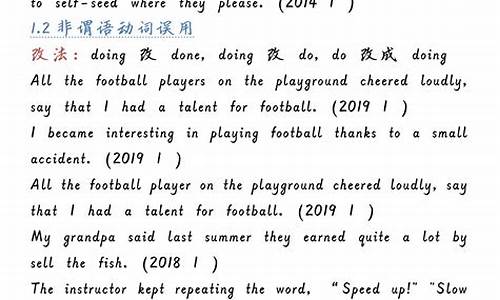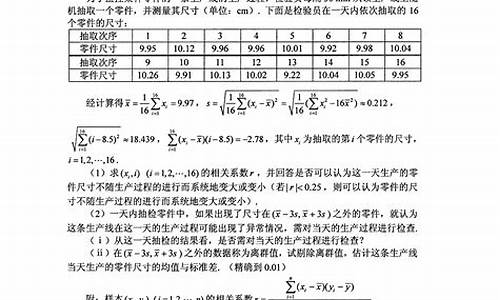您现在的位置是: 首页 > 教育改革 教育改革
高考英语短文改错考点,高考英语短文改错考点总结近8年
tamoadmin 2024-05-20 人已围观
简介高考英语短文改错高频错误总结 老师叮咛:李辉老师说 , 所谓聪明都是小聪明,而真正的智慧,就是能够学会去发现各种规律 。 君子性非异也,善假于各种规律也 。 因此,学 会找到规律 ,至关重要!本文也将通过对 短文改错高考高频考点总结 来 帮助 同学 找到规律 。下文经过了全网首席高考英语名师李辉老师团队高度认真的整理校对 , 无错 、 可信 ! 供全国各省高

高考英语短文改错高频错误总结
老师叮咛:李辉老师说 , 所谓聪明都是小聪明,而真正的智慧,就是能够学会去发现各种规律 。 君子性非异也,善假于各种规律也 。 因此,学 会找到规律 ,至关重要!本文也将通过对 短文改错高考高频考点总结 来 帮助 同学 找到规律 。下文经过了全网首席高考英语名师李辉老师团队高度认真的整理校对 , 无错 、 可信 ! 供全国各省高中生打印 、 学习 、 背诵 。
1.many与much混淆
eg:(2014全国卷2) We did not need to do so?many(much)homework.
2.时态问题
eg:(2015全国卷1) I think(thought)would be happy.
3.名词单复数问题
eg:(2014全国卷1) Since then for all these year(years),we have been allowing tomatoes seed where they please.
4.before与ago混淆
eg:(2014全国卷1) Nearly five years before(ago),and with the help of our father ,my sister and I planted some?cherry tomatoes in our back garden.
5.主被动问题
eg:(2017全国卷3) About one month after this photo was took(taken),I entered my second year of high school and become a new member of the school music class.
6.形容词,副词混淆
eg:(2014全国卷1) We are growing wonderfully(wonderful)tomatoes at no cost!
7.somewhere与everywhere 类似这种逻辑混淆
eg:(2014全国卷1) As a result ,the plants are growing somewhere(everywhere).
8.主语/代词混淆
eg:(2016全国卷2) If we go on a trip abroad,we can broaden you(our)view and gain knowledge we?can not get from books.
9.here与there混淆
eg:(2018全国卷1) Last winter when I went here(there)again,they had a big separate house to raise dozens of chickens.
10.all与both混淆
eg:(2017全国卷2) Mr. and Mrs. Zhang all(both)work in our school.
11.原级比较级最高级混淆
eg:(2018全国卷3) I was afraid to speak in front of a larger(large)group of people.
12.冠词用错
eg:(2014全国卷2) There are all kinds of the(删去)flowers and trees around the classroom buildings.
13.介词后加动名词
eg:(2015全国卷2) After loos(looking)at the toy for some time,he turned around and found where his parents were missing.
14.so与 such的误用
eg:(2016全国卷3) However,my parents didn't seem to think such(so).
15.并列结构
eg:(2017全国卷1)“Speed up!”“Slow down!”“Turning (Turn)left!”
16.another与other混淆:another+单数,other+复数
eg:(2018全国卷1) The first time I went here,they were living in a small house with dogs,ducks and another(other)animals.
17.对于添词,一般添在名词前
eg:(2015全国卷2) Five minutes later,Tony saw his parents.
18.基数词序数词混淆
eg:(2017全国卷1) In the summer holiday following my?eighteen(eighteenth)birthday,I took driving lessons.
19.反身代词混淆
eg:(2018全国卷3) I had done myself(may)homework,but I was shy.
20.从句连词混淆
eg:(2015全国卷2) After looking at the toy for some time,he turned around and found where(that)his parents were missing.
eg:(2017全国卷3) In their spare time,they?were interested in planting vegetables in their garden,that(which)is on the roof top of their house.
21.虚拟语气的错误:一坚持二命令三建议四要求+(that)+sb+(should)do
eg:(2016全国卷2) Some classmates suggest we can(去掉)go to places of interest nearby.
22.Beside与besides的错误
eg:(2017全国卷2) Beside(Besides),they often get some useful information from the Internet.
23.to do形式弄混以及情态动词+do
eg:(2018全国卷1) As a kid,I loved to watch cartoons,but no matter how many times I asked to watching(watch)them,my parents would not do(去掉)let me.
24.非谓语动词混淆
eg:(来源典型例子) We should not leave the tap water run(running)or waste any materials in the laboratory class.
[if !supportLists]25.?[endif]对于改错常用的固定搭配
play+球类
in the Us
tear……apart
in English
On(去掉)last this Thursday
leave……for
play……with
dream……of
eager……to
with the help of
with the development of
time for
enter into
in the countryside
be amazed at
英语是一种西日耳曼语,在中世纪早期的英国最早被使用,并因其广阔的殖民地而成为世界使用面积最广的语言。下面就是小编给大家带来的英语改错题规则及原则,希望大家喜欢!
英语改错题规则及原则
一、短文改错万能公式
1.谓语动词的错误是历年考试的重点和热点,常见动词错误类型有:
①一般现在时与一般过去时错用;
②and前后动词时态不一致;
③主谓不一致;
④缺少动词,特别是be动词;
⑤第三人称单数形式错用;
⑥主动语态和被动语态错用。
2.名词的常见错误:
单复数名词错用,可数名词与不可数名词错用。
3.连词错误:
连词包括关系代词、副词,并列连词and/or/but等。
关于连词,一般考查从句关系:who/whom/whose/what/which/how/why/when/where/if/whether等。
4.冠词错误:
误用a和an(根据单词的第一个音素来判定);
误用a/an和the(固定搭配,或泛指、特指;多冠词或少冠词)
5.形容词和副词错误:
系动词后用形容词(be/am/is/are/was/were/become/go/感官性动词smell/feel);
词性的误用(形容词修饰名词;副词修饰动词、形容词)。
6.代词错误:
代词的主格和宾格(I/me;he/him;she/her;we/usthey/them)错误;
反身代词(myself/yourself/himself/herself/themselves/ourselves)使用错误;
代词的单数和复数使用错误;
代词指代错误;
多代词或少代词。
7.非谓语动词的常见错误:
不定式、动名词作主语、宾语时;
and连接的不定式或动名词前后不一致(尤其距离较远时);
介词后用动名词形式作宾语;
某些动词后要求接动名词或不定式。
8.介词错误:
词组中的介词误用;
介词意思理解偏差;
介词的多用或少用
二、短文改错解答口诀
动词形,名词数;
注意形和副;
非谓动词细辨别;
习惯用法要记住;
句子成分多分析;
逻辑错误须关注。
1.动词形
主要包括两类错误:动词的时态和语态错误,以及主、谓不一致的错误。
例如:Myfavouritesportisfootball.Iwasmemberofourschoolfootballteam.Nowmypictureandprizeishanginginthelibrary.(are)
上述两例分别属于时态错误和主、谓不一致错误。找出此类错误的关键是树立牢固的时态概念,注意短文内容发生或存在的时间,保持时间概念的一致性。
2.名词数
指名词单、复数形式的用法错误。常表现为将名词复数写成单数。
例如:?sothatI’llgetgoodmarksinallmysubject.(subjects)
3.区分形和副
即区分形容词和副词在句子中的作用和具体用法。这也是高考短文改错的常考点。
例如:I’msurewe’llhaveawonderfullytimetogether.(wonderful)
Unfortunate,therearetoomanypeopleinmyfamily.(Unfortunately)
需要注意的是,形容词多用来做定、表、补语等,而副词只能在句子中作状语,修饰动词、形容词、副词或整个句子。第一例中的wonderful作定语修饰time,第二句的Unfortunately作状语修饰整个句子。
4.非谓动词细辨别
这是考查最多的错误形式之一。主要有分词和动名词类错误,也包括不定式类错误。
例如:
inmysparetime,butnowIaminterestinginfootball.(interested)Playfootballnotonlymakesusgrowuptallandstrongbutalso?(playing)
Myparentsloveme?andwilldoalltheycan∧makesure?(to)
上述二、三例分别是动名词作主语,和不定式作目的状语。一般的,现在分词有主动态和进行时的含义,而过去分词具有被动态和完成时的含义,不定式有将来时态的含义。
5.习惯用法要记住
主要考查习惯搭配方面的基础知识。这也是历年高考的常考点,其错误表现形式主要有三种:多词、少词和搭配错误。
例如:Itwasverykindforthemtomeetmeattherailwaystationand?(of)
Wemustkeepinmindthatweplayfortheteaminstead∧ourselves.(of)
6.句子成分多分析
不同的句子成分要用不同的词类;不同的语景要选择不同的词语。这些都有待我们对句子结构和句子成分作细致的分析,才能找出用词不当的错误。
例如:They∧eagertoknoweverythingaboutChinaand?(were)
IliveinBeijing,whereisthecapitalofChina.(which)
第一例漏掉了谓语动词were,这是受寒于习惯的影响而导致的错误;第二例则是词类与它在句子中的成分不相符,where是副词,不能作主语。
7.逻辑错误须关注
与句子的上、下文不一致,甚至相矛盾,属于逻辑性错误。如称谓上的张冠李戴,人名、地名、时间、方位等方面的错误,常是这类错误的考查对象。
例如:TheSmithsdidhisbesttomakemefeelathome.(their)
First,letmetellyousomethingmoreaboutmyself.(去掉more)
nowayofsettingthematterexceptbysellingtheset.Nowsomeoneathomereadsinstead.(everyone)上述第一例中的主语是Smiths(史密斯夫妇俩),因此后面的his不合逻辑。第二例中的more在这儿表“再”的意思,才开始告诉别人,怎么能说“再告诉你一些事”?第三例讲的是为了解决看电视时的争端,“我们”把电视机卖了;晚上没电视看了,所以与从前一样,大家又都读书了,所以该用everyone。
除了上述错误类型外,常考的错误形式还有:连词but,and,or和so的用法错误(可以归类为逻辑错误),以及冠词的用法错误等。
例如:
Shewassmilingbutnoddingatme.(and)
Itlooksasifmyparentstreatmeasavisitorandaguest.(or)
Wemaybeonefamilyandliveunderasameroof.(the)
三、短文改错参考原则
1.改动以最少为原则;
2.虚词以添加或删除为原则;
3.实词以改变词形为原则;
4.以保持句子原意为原则;
5.核对错项时,若的确有一时难以改出的地方,可以参考所改动项是否基本符合“1:1:8”的比例:即多一词1个,缺词1个,错词8个;
6.核对改正的语法项目是否有重复,因为短文改错往往覆盖面广,一般不会出现重复考查某个语法点的现象;
7.核对答题符号是否规范,位置是否准确,看看有无遗漏符号,忽略字母大小写和拼写等问题。









